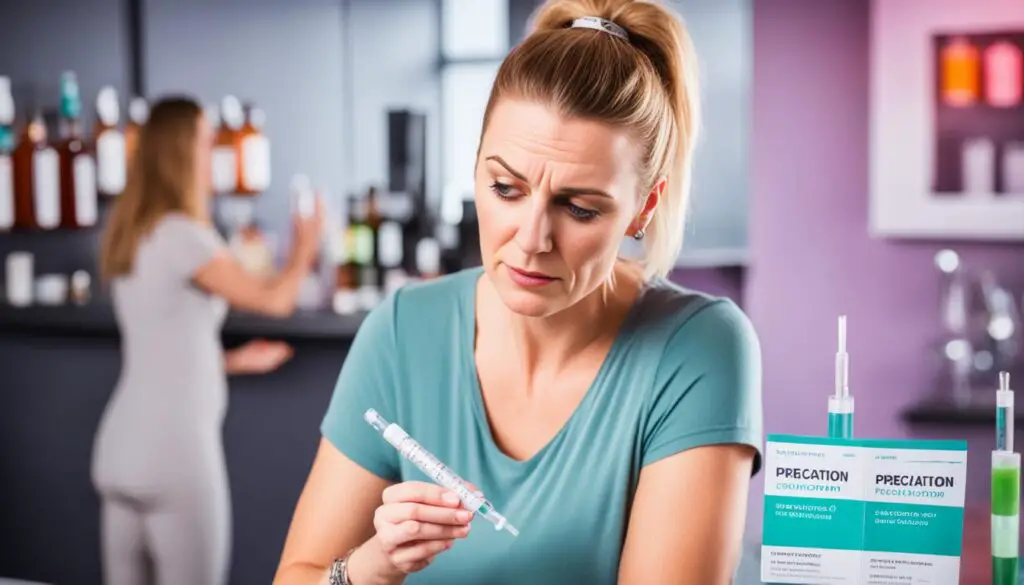Did you know that combining alcohol with HCG injections can pose serious risks to your health and treatment? Find out the potential dangers and side effects of mixing alcohol and HCG injections to ensure the best outcomes for your health and well-being.
Key Takeaways:
- Mixing alcohol and HCG injections can lead to complications and potential harm.
- Inform your healthcare provider about any pre-existing conditions or allergies before using HCG injections.
- Follow the recommended injection method and dosage for proper usage of HCG injections.
- HCG injections may interact with certain herbal or dietary supplements, as well as alcohol.
- Side effects of HCG injections should be closely monitored and reported to your healthcare provider.
What is HCG?
HCG, or human chorionic gonadotropin, is a hormone that plays a crucial role in various physiological processes in both men and women.
In women, HCG is commonly used in combination with other fertility drugs to enhance the chances of successful pregnancy. By stimulating the release of mature eggs from the ovaries and supporting the maintenance of the uterine lining, HCG aids in the conception process.
For men, HCG helps in the production of testosterone, which is essential for sperm production and overall reproductive health. It acts as a natural alternative to testosterone replacement therapy.
Beyond its uses in fertility treatments, HCG is also employed in medical treatments for certain birth problems in male children, such as cryptorchidism, where the testicles do not descend properly into the scrotum.
Precautions and Considerations

Before using HCG injections, it is important to inform your healthcare provider about any pre-existing conditions or allergies you may have. This includes conditions such as asthma, cysts on the ovaries, heart disease, migraines, kidney disease, ovarian or prostate cancer, seizures, and any history of allergic reactions. It is also crucial to mention if you are currently pregnant or breastfeeding.
Why Precautions and Considerations Are Important
Discussing your medical history and current circumstances with your healthcare provider is essential before starting HCG injections. By sharing information about any pre-existing conditions or allergies, your healthcare provider can assess the potential risks and determine if HCG injections are suitable for you.
“It is important to have an open and honest conversation with your healthcare provider to ensure that HCG injections do not pose any harm or interfere with your current health status or medications you may be taking.” – Dr. Emily Richards, MD
For individuals with asthma or heart disease, it is crucial to evaluate whether HCG injections may exacerbate these conditions. Cysts on the ovaries or a history of ovarian or prostate cancer may also impact the decision to use HCG injections. Furthermore, if you have a history of seizures or are currently pregnant or breastfeeding, it is vital to consider the potential effects of HCG injections on these situations.
By providing comprehensive information to your healthcare provider, you both can work together to make an informed decision regarding the use of HCG injections. Your healthcare provider may recommend alternative treatments or adjust the dosage of HCG injections based on your specific circumstances.
| Condition | Precautions |
|---|---|
| Asthma | Asthma symptoms may worsen with HCG injections. Close monitoring and adjustments to treatment may be necessary. |
| Cysts on the ovaries | The presence of cysts on the ovaries may require further evaluation to determine if HCG injections are appropriate. |
| Heart disease | HCG injections may impact the cardiovascular system. Careful consideration and evaluation may be necessary. |
| Migraines | Individuals with a history of migraines should discuss potential interactions and risks with their healthcare provider. |
| Kidney disease | Kidney function may be affected by HCG injections. Monitoring and possible dosage adjustments may be needed. |
| Ovarian or prostate cancer | HCG injections may have implications for individuals with a history of ovarian or prostate cancer. Evaluation and individualized plans are essential. |
| Seizures | Seizure activity may be influenced by HCG injections. Close monitoring by a healthcare provider is crucial. |
| Allergic reaction | Individuals with a history of allergic reactions should inform their healthcare provider to mitigate potential risks. |
| Pregnant | HCG injections during pregnancy can have adverse effects. Pregnancy testing and strict avoidance of HCG injections during pregnancy are necessary. |
| Breastfeeding | It is essential to consult with a healthcare provider to determine if HCG injections are safe during breastfeeding. |
By considering these precautions and sharing relevant information with your healthcare provider, you can make informed decisions about the use of HCG injections that prioritize your health and well-being.
Proper Usage of HCG Injections
When it comes to the proper usage of HCG injections, there are a few key considerations to keep in mind. Your healthcare provider will guide you on the injection method and dosage that is most appropriate for your specific needs. It is crucial to follow their instructions carefully to ensure the safety and effectiveness of your treatment.
One important aspect of using HCG injections is understanding the injection method. These injections can be administered either into a muscle (intramuscular injection) or under the skin (subcutaneous injection). Your healthcare provider will demonstrate the correct technique for administering the injections and provide you with thorough instructions to follow.
In addition to the injection method, it is essential to pay attention to the prescription label. The label will outline important information about the dosage, frequency, and duration of your HCG injections. It is crucial to adhere to these instructions and take the injections at the same time every day. This schedule helps maintain stable hormone levels and optimize the effectiveness of the treatment.
After using the needles and syringes for your HCG injections, proper disposal is of utmost importance. Sharps, such as needles and syringes, should never be disposed of in regular trash containers. Instead, they must be discarded in a designated sharps container. This ensures the safe disposal of potentially hazardous waste and helps protect others from unintentional needlesticks or exposure to bloodborne pathogens.
By following the proper usage guidelines for HCG injections, including the injection method, prescription label instructions, and sharps disposal, you can minimize risks and ensure the best possible outcomes for your treatment.
| Considerations for Proper Usage of HCG Injections |
|---|
| Consult with your healthcare provider to determine the appropriate injection method. |
| Follow the instructions on the prescription label for dosage, frequency, and timing of injections. |
| Dispose of used needles and syringes in a sharps container to ensure safe and proper disposal. |
Potential Interactions with Alcohol

When undergoing HCG injections, it is crucial to be mindful of potential interactions with alcohol. While the main focus is typically on the HCG injections themselves, it is important to consider other factors that could impact your treatment. One factor to consider is the use of herbal and dietary supplements, such as blue cohosh, black cohosh, and chasteberry. These supplements may interact with the HCG injections, which could affect the effectiveness and safety of your treatment.
In addition to herbal and dietary supplements, alcohol consumption can also potentially interact with HCG injections. It is essential to disclose your alcohol consumption to your healthcare provider, as it can affect the overall outcome of your treatment. Interactions between alcohol and HCG injections can lead to unpredictable reactions and potentially compromise the effectiveness of the HCG treatment.
As with any medication or treatment, it is vital to inform your healthcare provider about all the supplements, non-prescription drugs, or herbal remedies you are taking. This includes providing accurate information about your alcohol consumption habits. By disclosing this information, your healthcare provider can provide you with personalized advice and recommendations to ensure the best possible treatment outcome.
It is important to remember that everyone’s body chemistry is unique, and what may be safe or effective for one person may not be for another. Therefore, it is crucial to prioritize open communication with your healthcare provider throughout your HCG treatment. Your healthcare provider will be able to monitor your progress and make any necessary adjustments based on your individual needs and circumstances.
“Being transparent about your alcohol consumption and any supplements you are taking ensures that your healthcare provider has all the necessary information to provide you with the best possible care.”
| Interactions | Impact |
|---|---|
| Herbal Supplements (e.g., blue cohosh, black cohosh, chasteberry) | Potential interaction with HCG injections, effects on treatment efficacy |
| Alcohol Consumption | Possible interaction with HCG injections, compromising treatment effectiveness |
It is important to be proactive and responsible when it comes to potential interactions with alcohol during HCG treatment. By openly communicating with your healthcare provider and providing accurate information about any supplements or alcohol consumption, you can ensure the best possible outcomes from your HCG injections. Prioritizing your health and treatment success requires awareness and compliance with your healthcare provider’s recommendations.
Monitoring and Side Effects
When it comes to HCG injections, close monitoring by your healthcare provider is crucial. Monitoring allows your healthcare provider to track the effects of the injections on your body and make any necessary adjustments to ensure the best outcomes.
It’s important to be aware of potential side effects that may arise from HCG injections. While some side effects are common and may not require immediate medical attention, it’s essential to report any persistent or bothersome symptoms to your healthcare provider. These side effects include allergic reactions, breathing problems, breast enlargement, nausea, vomiting, pelvic pain, weight gain, urinary problems, acne, and emotional changes.
By closely monitoring your progress and being proactive in reporting any side effects, you can work together with your healthcare provider to ensure the safe and effective use of HCG injections.
Recognizing Allergic Reactions
Allergic reactions can be serious and should be addressed immediately. If you experience symptoms such as difficulty breathing, chest tightness, swelling of the face or throat, or a rash or hives, seek medical attention right away. Your healthcare provider will be able to evaluate the situation and provide the necessary treatment to alleviate your symptoms.
“Monitoring and reporting side effects to your healthcare provider is crucial to ensure the safe and effective use of HCG injections.”
Dealing with Emotional Changes
Emotional changes are another potential side effect of HCG injections. Some individuals may experience mood swings, irritability, or increased emotions while undergoing treatment. It’s important to communicate any emotional changes to your healthcare provider so they can provide guidance and support throughout your treatment journey.
Importance of Prompt Communication
Whether it’s breast enlargement, weight gain, or any other side effect, prompt communication with your healthcare provider is key. They can assess the severity of the side effect and determine the appropriate course of action.
Remember, every individual may respond differently to HCG injections, and your healthcare provider is there to guide and support you through the process. Open and honest communication is vital for a successful treatment experience.
Alcohol and Fertility Treatments

A study conducted in Denmark examined the effects of alcohol consumption on the success rates of fertility treatments, including intrauterine insemination (IUI), in vitro fertilization (IVF), and frozen embryo transfer. The study aimed to determine whether moderate alcohol consumption had any significant impact on the outcomes of these treatments.
The Danish study found that moderate alcohol consumption, defined as 1-2 drinks per day, did not significantly affect the success rates of fertility treatments. Patients who consumed alcohol within this moderate range did not experience a decrease in their chances of conception through IUI, IVF, or frozen embryo transfer.
It is important to note, however, that as patients approach IUI or egg retrieval, it is generally recommended to cease all alcohol intake. This precaution is due to potential risks that alcohol consumption may pose to the early embryo and fetus. Therefore, it is advisable for individuals undergoing fertility treatments to abstain from alcohol during these critical stages.
If you have any questions or concerns about the compatibility of alcohol consumption and your specific fertility treatment, it is best to consult with your healthcare provider. They can provide personalized advice and recommendations based on your individual circumstances.
| Fertility Treatment | Alcohol Effects |
|---|---|
| Intrauterine Insemination (IUI) | No significant impact on success rates |
| In Vitro Fertilization (IVF) | No significant impact on success rates |
| Frozen Embryo Transfer | No significant impact on success rates |
When it comes to fertility treatments, it is essential to prioritize your health and maximize the chances of a successful outcome. Following the guidance of your healthcare provider and making informed decisions regarding alcohol consumption can contribute to the overall efficacy of your treatment.
Recommendations for Alcohol and HCG Usage
As you progress through your fertility treatment, such as intrauterine insemination (IUI) or egg retrieval, it is generally advisable to cease alcohol consumption. This precaution is recommended to minimize any potential risks that alcohol may pose to the early embryo and fetus.
However, it is vital to have an open discussion with your healthcare provider regarding alcohol cessation and follow their recommendations. Your healthcare provider is the best resource for personalized advice based on your specific circumstances.
If you have any questions or concerns about the compatibility of alcohol and HCG usage, it is essential to consult with your healthcare provider. They can provide you with the necessary information and guidance to make informed decisions about alcohol consumption during HCG injections.
Remember, your healthcare provider is there to support you throughout your fertility journey and address any queries or uncertainties you may have. Don’t hesitate to seek their professional guidance to ensure the safety and success of your treatment.
Conclusion
Mixing alcohol and HCG injections can pose certain risks and considerations. It is important to be aware of the potential interactions and side effects that can arise from combining alcohol with HCG injections. By properly monitoring your treatment, taking necessary precautions, and closely following your healthcare provider’s recommendations, you can ensure the safety and efficacy of your HCG injections.
Understanding the potential risks of alcohol and HCG injections is crucial in maintaining your overall health and optimizing the effectiveness of your treatment. Adhering to the prescribed dosage and injection method, as well as disposing of needles and syringes properly, are important steps in minimizing potential complications.
Your healthcare provider plays a vital role in guiding you through your HCG injection journey. They can provide personalized advice, answer any questions, and address any concerns you may have about the compatibility of alcohol and HCG usage. Open and honest communication with your healthcare provider will help ensure that your treatment plan is tailored to your specific needs and circumstances.
FAQ
What are the risks of mixing alcohol and HCG injections?
Mixing alcohol and HCG injections can pose serious risks to both your health and the efficacy of your treatment.
What is HCG?
HCG, or human chorionic gonadotropin, is a hormone used for various purposes in both men and women.
What precautions should be taken with HCG injections?
It is important to inform your healthcare provider about any pre-existing conditions or allergies before using HCG injections.
How should HCG injections be used?
HCG injections can be administered either into a muscle or under the skin. It is vital to follow the instructions on the prescription label and take the injections at the same time every day.
Can alcohol interact with HCG injections?
Yes, alcohol can potentially interact with HCG injections. It is important to inform your healthcare provider about your alcohol consumption.
What are the side effects of HCG injections?
Side effects of HCG injections can include allergic reactions, breathing problems, breast enlargement, nausea, vomiting, pelvic pain, weight gain, urinary problems, acne, and emotional changes.
How does alcohol affect fertility treatments?
Moderate alcohol consumption has been found to have minimal effects on the success rates of fertility treatments. However, it is generally recommended to cease alcohol intake as you approach certain stages of treatment.
What are the recommendations for alcohol and HCG usage?
It is generally recommended to discuss any concerns or questions about alcohol and HCG usage with your healthcare provider for personalized advice.
What are the risks and considerations of alcohol and HCG usage?
Mixing alcohol and HCG injections can carry certain risks and considerations. Proper monitoring, precautions, and adherence to healthcare provider recommendations are essential.




